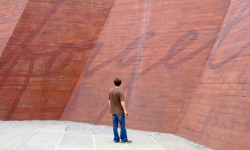
Psalm 29:1-2 defines worship as giving God the honour he deserves. Rick Warren says: “Anything you do that brings pleasure to God is an act of worship.”1 So, worship is not so much a ‘bless me’ exercise as a ‘bless God’ one.
Nature is tailor-made for any ‘bless God’ activity. It is both a place for, and participant in, worship.
For years I wondered why I didn’t connect with God very much through corporate worship within a church building. Then I read John Walton. He writes: “God not only sets up the cosmos so that people will have a place; he also sets up the cosmos to serve as his temple.”2 Gary Thomas’s 1996 book Sacred Pathways identifies me as a naturalist. God communicates most deeply to my heart through the beauty, grandeur, space, silence, symbolism and parable of the natural world.
Nature is also a participant in worship. Psalm 96:13 says, “Let all creation rejoice before the Lord” (NIV). Throughout Scripture we see praise to God coming from trees, fields, the heavens, seas, sun, moon, stars, clouds, ocean creatures, lightning, hail, snow, rivers, mountains, hills, wild animals, cattle, birds, small creatures, and much more (1 Chronicles 16:29‑34; Nehemiah 9:6; Isaiah 55:12-13; Revelation 5:13). Everything that breathes joins in (Psalm 150:6). Creation’s praise is largely inanimate and inarticulate, visual rather than verbal, but it is nonetheless real.
Creation, then, is both temple and choir. That’s a key reason why I want to preserve and protect the natural world. The way we treat nature either facilitates or frustrates, helps or hinders worship. When we damage the environment, we harm not only a context for worship, and a source of inspiration for worship, but also some of the very phenomena that God created to render worship. I also regard caring for nature itself as an act of worship because those caring actions bring God honour, bless him, fulfil his purposes, align with his heart’s desire, and give him pleasure.
Caring for creation should become an integral expression of worship, a natural outworking of our love for God and others. Conversely, when we fail to care for creation we may well be dishonouring God, and causing God displeasure. Food for thought.
Reflection: Phillip Donnell
Phillip is the Director of New Creation New Zealand, a Christian environmental organisation that helps churches to utilise creation care as a mode and means of mission. He is happy to do presentations to groups on this theme. Email Phillip.
References:
- Rick Warren, The Purpose Driven Life, (Grand Rapids: Zondervan, 2002), 64.
- John H. Walton, The Lost World of Genesis One: Ancient Cosmology and the Origins Debate, (Downers Grove: InterVarsity Press, 2009), 148. The idea that God has made the world his sanctuary finds scriptural support in Acts 7:48 and 17:24.
Scripture:
Unless otherwise specified, Scripture quotations are from New Revised Standard Version Bible, copyright ©1989 National Council of the Churches of Christ in the United States of America. Used by permission. All rights reserved.
Scripture quotations marked (NIV) are taken from the Holy Bible, New International Version®, NIV®. Copyright © 1973, 1978, 1984, 2011 by Biblica, Inc.™ Used by permission of Zondervan. All rights reserved worldwide. www.zondervan.com. The “NIV” and “New International Version” are trademarks registered in the United States Patent and Trademark Office by Biblica, Inc.™


